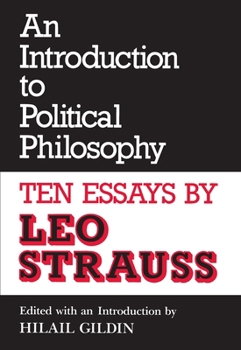An Introduction to Political Philosophy: Ten Essays by Leo Strauss
Select Format
Select Condition 
Book Overview
A reissue of the 1975 edition of Strauss' views regarding the nature of political philosophy. A reissue of the 1975 edition, with four added essays, this collection offers a clear introduction to Strauss' views regarding the nature of political philosophy, its chief contemporary antagonists, its classical forms, and its modern version. It gives the reader Strauss' thoughts on what political philosophy has been and should be again.
Selected...
Format:Paperback
Language:English
ISBN:0814319025
ISBN13:9780814319024
Release Date:August 1989
Publisher:Wayne State University Press
Length:368 Pages
Weight:0.95 lbs.
Dimensions:0.8" x 5.4" x 8.0"
Customer Reviews
2 ratings
If you only want to read one book by Leo Strauss....
Published by Thriftbooks.com User , 16 years ago
this would be a good choice. This edition of this book contains ten essays that introduce the reader to the main themes of the Straussian approach to political philosophy. My only caveat is for people who have already read some other books by Strauss or who plan to- most of what is contained in this book is in other collections of Strauss' writing (e.g., the first two essays are also in What is Political Philosophy) or are excerpts from other books (e.g., the fourth essay is the first chapter of Natural Right and History). So if you are the sort of person who likes to read widely in an author, this may not be your best choice. The University of Chicago Press should publish a standard edition of Struass' complete writings (hint, hint). What I plan to offer in this review is some background to the reading of Strauss. This will not read like a review in the sense that I will provide little summary of the essays. But everything I tell you in this review speaks to the writings in this book. Strauss' work is best understood within the context of his own history. The essential fact to grasp in his biography is that he was Jewish and grew up in Germany in the early part of the twentieth century. It is impossible to overemphasize the shock to his being-in-the-world of the Germans electing Hitler. During his education, he was greatly influenced by his study of Nietzsche, Weber, Husserl and Heidegger. But his primary focus was on the "Jewish problem". Strauss' analysis led him to three basic alternatives: assimilation, political Zionism and an authentic return to the Jewish orthodox religious tradition of the Galut (readers who want to know more about this phase of Strauss' life should go to Daniel Tanguey's superb book, Leo Strauss: An Intellectual Biography). These investigations led him to Spinoza's religious critique which became the subject of his first book. Strauss concluded that Spinoza (along with predecessors like Hobbes and critics to come like Locke) failed in his rationalist Enlightenment critique of revealed religion. Strauss concluded that the Enlightenment as a whole was based on the mistaken belief that the possibility of revelation had been shown impossible. According to Strauss, it had not. Equally, revealed religion was unable to meet the critique of rationalism on its own terms. This is one of the essential points that has to be understood in relation to Strauss' philosophy. It is based on unresolvable tensions. The Straussian is unwilling to close off the possibility of revelation or of philosophy but strives to stay open to the way of life that is the investigation of that alternatives. Philosophy (the love of wisdom) is not the knowledge of wisdom (which we may never achieve but can come closer to achieving). Socrates is Strauss' preeminent exemplar of the philosophical life. All of Strauss' historical investigations led him to the conclusion that much of the history of philosophy was misunderstood and mistaught. Most of his work, of
A great intro to classical philosophy
Published by Thriftbooks.com User , 20 years ago
Leo Strauss' ten essays on political philosophy is a great way to start to learn about "classical political philosophy." Strauss goes into detail about early Greek classical philosophers such as Aristotle, Plato and Socrates. These men believed that an educated ruling elite would make the best politicians. Men of "good virtue" and character would protect the rights of their citizens. Modern philosophers starting with Machiavelli reject the classical view as undemocratic and elitist. Only wealthy men of leisure would have time to develop the virtues and character necessary to rule. Machiavelli believed that man by nature was selfish and driven by ambition. Machiavelli is not interested in character formation and moral appeal but in building the right kind of institutions to govern society. Laws and justice would protect men from power hungry rulers. Modern philosophy is an out growth of the revolution that takes place in the natural sciences during the Enlightenment. The purpose of science is the conquest of nature man is in control of human life. Philosophers from Machiavelli on become sectarian. "Everything good is due to man's labor rather than to nature's gift."Strauss goes into the idea of "liberal education". Men who rely on education and modern philosophical principles alone to build a better society wind up following the path of Marx, i.e. Communism, and Nietzsche and Heidegger, i.e. Fascism. Strauss, in the aftermath of WWII, spends his life touting the virtues of classical philosophy as a way to turn back some of the harm done by modern philosophers. The reader comes away realizing that you need a mixture of both "rule of law" and "men of character" to build a good society. As a retired Army officer and student of political philosophy, I found this to be a great book to start one's journey into political philosophy.




